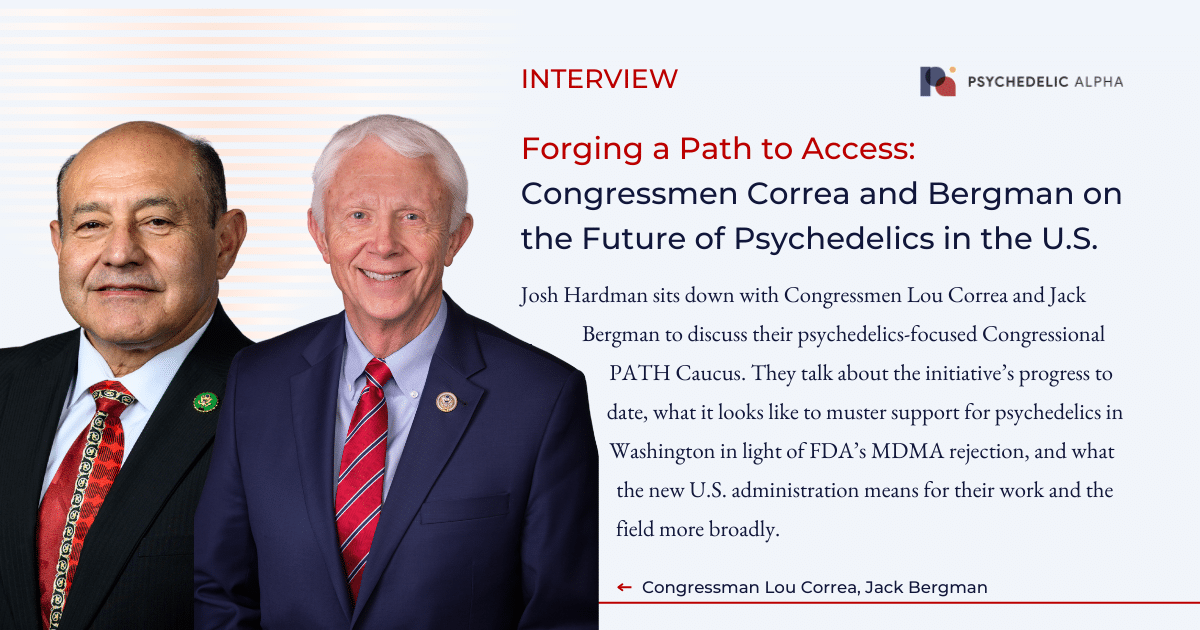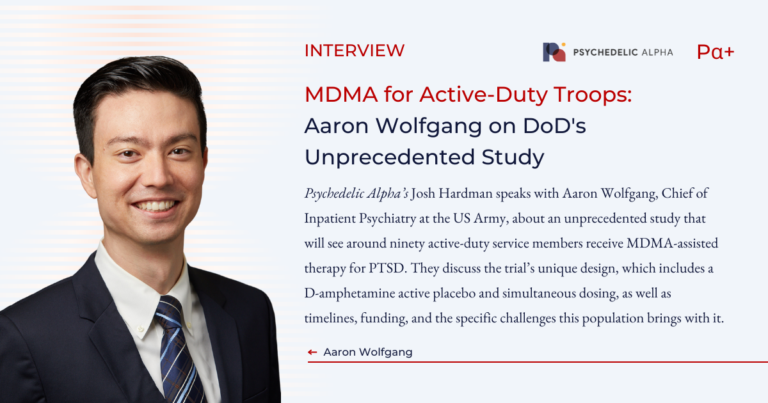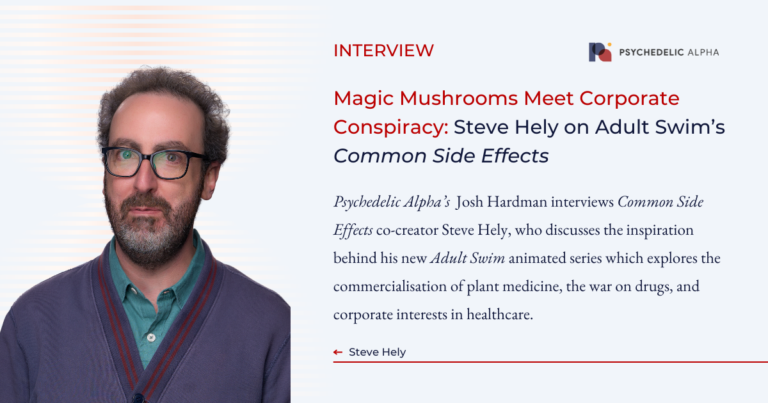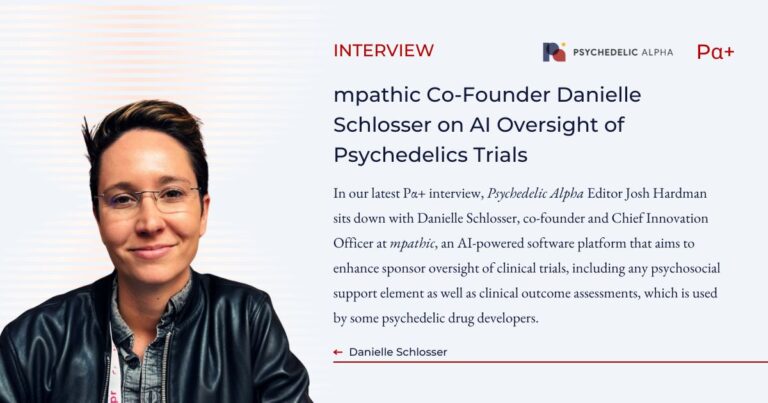In late 2022, Congressmen Lou Correa (D) and Jack Bergman (R) launched the Congressional Psychedelics Advancing Clinical Treatments (PACT) Caucus, which later became the Psychedelics Advancing Therapies (PATH) Caucus. Among other things, their bipartisan initiative aims to boost awareness of the potential of psychedelics in healthcare and the state of current research among their colleagues in Congress.
Our Editor Josh Hardman sat down with Correa and Bergman to discuss their progress to date, what it looks like to muster support for psychedelics in Washington in light of FDA’s MDMA rejection last summer, and what the new U.S. administration means for their work and the field more broadly.
The Origins of a Bipartisan Mission
Josh Hardman, Psychedelic Alpha: Thanks for making the time. How did this partnership come about?
Congressman Jack Bergman: Lou and I were freshmen together nine years ago. Certain people, when you meet them, you know they’re the real deal. I’m just proud that Lou is the real deal because when you have a partner, and a partnership like we’ve built, it is about the finest concrete you can put underneath any structure to hold it up. That’s how we work together.
Why that’s important is that both Democrats and Republicans, who we are trying to bring into the PATH caucus to try to educate, inform, and open their eyes as to what can be, they see when we work together that we radiate that sense of partnership that draws others in.
Congressman Lou Correa: It’s interesting you talk, General, about our nine years. Something else we have in common is that this is not our first career; we’re in Congress not to stake our flag, so to speak, but rather we’re there to do some good.
I’ve worked on Veterans Affairs for a number of years and to think that right now we have 20 veteran suicides a day in the United States, that’s just unacceptable. The state of mental health in this country is unacceptable: the homeless, drug abuse, alcoholism. So this is a good issue for us to both dive into and I think we may have stumbled on what I think is a cure, a solution that’ll move us forward in this country. So I’m excited to work with General Jack Bergman on this issue.
Hardman: I’m all the way over here in London, and our politics is quite polarized. But I think US politics probably takes the biscuit on that front, at least at the moment. So I think these stories of bipartisan coalition and issues that both sides of the aisle can see eye to eye on are increasingly fleeting.
Bergman: Well, think about how boring it would be if the media followed folks like Lou and I around and saw us laughing, joking, and having a cup of coffee together. They’d go: ‘Gosh, you guys are so boring!’ So the point is, we’re grown men, we’re grown adults who look at life very seriously but can laugh at ourselves. Unfortunately, what the public sees here in the US is what we call the cat fights.
Correa: Jack is absolutely correct. 70 to 80% of us are boring in Congress, it’s the outlying 20%, 10% on each side, that get all the attention, but many of us work very hard to get things done for this country, and that’s what we do on a day-to-day basis.
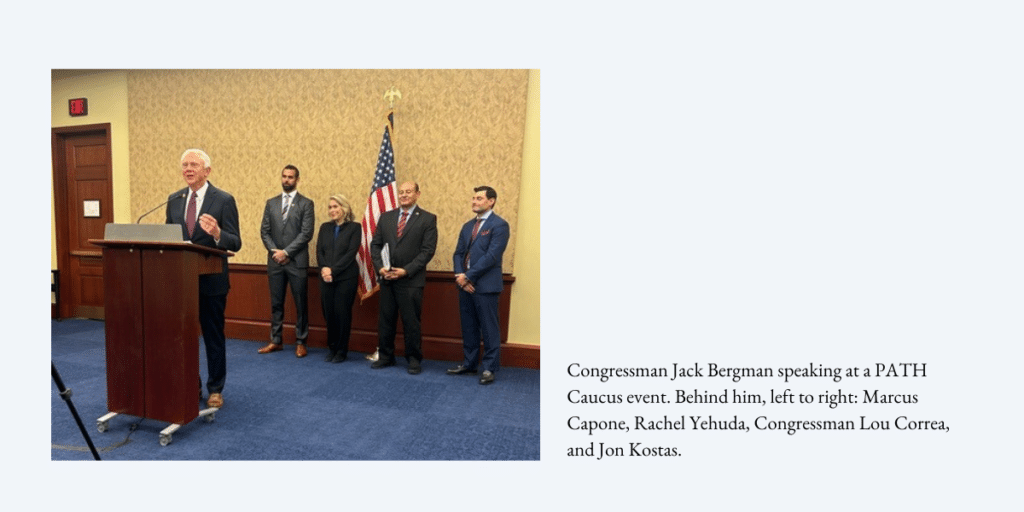
The Promise of Psychedelic Therapies
I learned two important things. Number one, this stuff really works, and number two, you gotta know what you're doing when you're administering it.
Congressman Lou Correa
Hardman: While your interpersonal relationship might be boring in that there’s not much drama, at least you have the psychedelics bit to make it more exciting!
I know it’s a busy time, so I’ll skip past the usual opening questions of how you became interested in psychedelics and so on. Instead, can you share what you have achieved in the last two years, and what is most pressing this year?
Bergman: I think one of the strengths of the PATH Caucus when we started putting together our roundtables was that we brought in some really high level researchers that had decades of research in new therapies.
A gentleman came down, I think was from New York City, and talked about the fact that there had been no breakthrough therapies in this area since the 1950s, since the beginning of ‘the pill society’. The energy behind creating breakthrough therapies had dissipated over time.
Well, here we are. Now we have a chance. As we’ve seen, there’s enough evidence, and so many of our veterans have experienced it, especially those who have gone outside our country to get their therapies (and Lou has visited the places just South of the border). Why wouldn’t we take a look at a breakthrough therapy that could save lives, and help others deal with their issues?
What struck me as the big bell ringing on the front end: We’d been sitting in a way of doing business for over a half a century without the change we knew we needed.
Correa: I think you’re right on, Jack. We’ve had 50-60 years of a war on drugs that has essentially shaped a way of thinking in the United States when it comes to some of these possible solutions that we’re talking about.
I started my career in this area, essentially talking to veterans. I used to Chair the Veterans Committee in the State of California State Senate and I would have roundtables talking to veterans, asking them, ‘What is it that we can do for you?’ Most of the time I would have a few veterans coming very quietly to tell me things like, ‘I prefer cannabis to these pills to take care of me’. And so that started my quest looking into cannabis for veterans. We haven’t made too much progress in that area, but nonetheless it was an alternative that veterans looked at.
I get to Congress and I started getting veterans telling me, ‘These psychedelics work for me’; other veterans telling me, ‘I’m cured because of these treatments.’ To me, it was just shocking to hear that; I’d never heard psychedelics as a medicine. And as Jack said, I got to the point where I actually went down to Tijuana to look at one of these clinics.
I found some very interesting facts. First of all, the therapy works. Under controlled conditions, with the appropriate therapist present and doctors, you can be cured of your PTSD. You can be cured of other mental illnesses, like nothing can cure.
At the same time, I found out that this is serious stuff. When patients go through this therapy they’ve got a nurse, an ambulance standing by, heart monitors connected to the patients going through this therapy, heart doctors because it’s very easy to overdose, very easy for you to go essentially flat-line, so to speak, if you don’t know what you’re doing.
So I learned two important things. Number one, this stuff really works, and number two, you gotta know what you’re doing when you’re administering it.
This gave me the conclusion that we need to research it. We need to find out how to calibrate the doses for patients, and we need to make sure that we begin to write rules and regulations on how to treat patients.
In many ways this therapy is going to become more and more popular. As I discussed this issue with my neighbors here in California, I find more and more people telling me, ‘I microdose with this stuff’, ‘I don’t tell anybody, but I microdose.’ It’s becoming very, very popular, which is an impetus for us to move quickly ahead and get our research done and figure out what works and what does not work.
FDA’s Rejection of MDMA
You've got Dr. Makary coming in as the new head of the FDA and there's going to be some changes in, I believe, probably the advisory panel, to get the right people literally on the bus, on the advisory panel, to create an objective look at next steps.
Congressman Jack Bergman
Hardman: Right. And last year, obviously the FDA issued a Complete Response Letter Lykos Therapeutics’ MDMA for PTSD. At the time, Congressman Correa, you described that as a big mistake: “today the FDA got it wrong in a big way”, you said. What’s your opinion on the rejection, and the path to approval for MDMA?
Correa: Well, as I mentioned earlier, 20 veteran suicides a day, plus the fact that this is becoming a very popular therapy. Just because the FDA is not moving forward does not mean people are not treating themselves or going to clinics outside the United States and dark alley clinics in the United States to get treatment. So for the FDA to just stop and say ‘we’re not moving forward’, I think it’s being a little naive.
Bergman: Just to put a fine point on that, the FDA, like most bureaucracies, is risk averse and they kind of hid behind their advisory panel’s recommendation not to approve. So what Lou and I are doing is again building the coalitions here to work with the FDA. You’ve got Dr. Makary coming in as the new head of the FDA and there’s going to be some changes in, I believe, probably the advisory panel, to get the right people literally on the bus, on the advisory panel, to create an objective look at next steps.
Where we play a positive role for the FDA is being a partner in Congress to kind of gently, if you will, nudge them, push them, work with them, so that they don’t do what they do out of fear of failure, because fear of failure paralyzes people and organizations.
So the next steps for us in the upcoming administration is to build more confidence in the FDA. I think we’ve done a good job over the last couple of years of building the confidence within the Veterans Administration for the research they’re doing. So I think it’s our opportunity to grow here as the PATH Caucus and, in the House of Representatives, it’s to work with the new folks coming in to build their confidence that they can assume risk for better results, because the risk, if they don’t, is more suicides and poor mental health.
Correa: And Jack, you’re absolutely right, let’s focus on the tremendous opportunity here. Our colleagues, like Congressman Luttrell, went through that therapy. Other veterans I’ve met have gone through that therapy and they all swear it changed their life completely.
And I have to point out that cannabis, in my opinion, is like a martini that people take. ‘I get a martini today, it gets me through the day’; ‘I get my cannabis today, it gets me through the day, tomorrow I’m going to need it again.’
But this treatment is a cure. It is a one and done cure. The opportunity here, not just for veterans but for our society, drug addictions. I mean one of our colleagues, her son-in-law, major alcoholic, goes to this therapy and is cured. I cannot find anything to compare it to.
The opportunity is unbelievable. You gotta jump on this one.
What Does the New Administration Mean for Psychedelics?
Think of the timing of the [FDA] decision, it was last August, and that decision was dropped right about the time we were all heading back to our districts to campaign for the November election. So that decision was probably purposeful, so that there was no coalition of people like Lou and I in DC thinking about it.
Congressman Jack Bergman
Hardman: The question I’m getting a lot is about what, precisely, the new administration means for psychedelics. There’s discussion that maybe the best path for Lykos now could be the political route, capitalising on new faces like Makary, who might be more open to it…
Correa: And that’s interesting because I’m very disappointed with the Biden administration, at least in the area of cannabis. They didn’t move forward to reschedule it.
Cannabis today, as you know, is legal in the vast majority of states but at the federal level it’s still a controlled substance. It doesn’t make sense. I am hopeful that with this new administration we can make some progress, both in cannabis and in psychedelics.
Hardman: I was just reading this morning that Trump’s DEA pick is Terry Cole, and I think he seems to have a somewhat anti-cannabis record. Some people in the cannabis field are saying the excitement has dimmed around the potential for rescheduling.
After the FDA rejection, have you found that it’s harder to get your colleagues to take meetings with you, to come to your psychedelics-focused roundtable events?
Bergman: I have not noticed any negative change.
Think of the timing of the decision, it was last August, and that decision was dropped right about the time we were all heading back to our districts to campaign for the November election. So that decision was probably purposeful, so that there was no coalition of people like Lou and I in DC thinking about it. There’s nothing accidental that bureaucracies do, unless they forget to lock a back door that they thought was locked and folks like Lou and I get in that back door and find out what the hell is going on in there, OK!
Again, that’s not Democrat or Republican, because when we appropriate money for any project we want to know where it’s going: is it getting to the end user? Or in this case, is the money for research creating a benefit, creating a therapy that’s going to cure the end user? It’s really kind of simple if you’re not trying to hide anything. You can have a great life!
Correa: I agree. I’ve not seen any people hesitate from working on this area. On the contrary, I think with the VA moving forward and actually investing $1.5 million in MDMA research, I think that’s a positive sign all the way around. And I think the FDA, most of us believe, made a mistake, a political mistake in the area of science. I think we’re going to continue to work positively in this area.
Psychedelics Champions in Government
Hardman: Aside from you two, and other notable people like Morgan Luttrell, who are the real champions that you see inside government, at the VA, and so on? Obviously one of them was Shereef Elnahal at the VA, who left his role last month. So who are the biggest champions for psychedelics within government, other than yourselves?
Bergman: With Doug Collins taking over as secretary of the VA, we’re going to be having a meeting with him in the next couple of weeks. We’ve already made contact. We served with him for at least one, if not two terms, when Lou and I were first here, so he’s not an unknown to us. The question is, who does he bring? They’re still finalizing the roles that people would fill.
Doctor Elnahal did a great job and created a good environment, and I hope that he will maintain himself as a resource somewhere in the mix. Obviously he’s got to go out and work for a living, to do what he does, but he will be an example to his successor of really good scientific research being pushed forward by the VA. So there’s some good lessons learned there, no negatives.
Correa: And I would also point to the many veterans groups that are pushing for this. I meet with them on a regular basis, and these are veterans that have actually gone through this therapy in either Mexico or Costa Rica.
So, despite the fact that in the United States it’s still illegal to undertake this therapy, it’s still being administered in clandestine clinics as well as in Mexico, and that’s a damn shame. Veterans are trying to cure themselves while we bureaucrats in Washington continue to drag our feet and we have suicides. It’s a damn shame.
Beyond Psilocybin and MDMA
Hardman: Well you two are a good example of a bipartisan coalition. As you know, representatives like Alexandria Ocasio-Cortez have expressed support for this research, even teaming up with former representative Matt Gaetz to do so.
But in terms of the substances mentioned most prominently in the PATH Caucus’ communications, there’s a clear focus on psilocybin and MDMA. Now that we have an LSD-based candidate in phase 3 studies, and obviously ketamine is increasingly used in mental health, I wanted to ask: Are you really just focused on MDMA and psilocybin, or would you expand your work to support drugs like LSD, which has a lot more cultural baggage, if you will?
Correa: I’m working on legislation right now, my innovative therapy centers, and Jack as well, for 2025 that will work in ibogaine, ketamine and psilocybin. So we’re not just looking at one therapy, we’re looking at all therapies under this umbrella.
Bergman: Absolutely. There’s a time in good research to rule out certain things that just didn’t work out the way you thought, but the science and the experimentation that you did with them are the reason that you eliminate them from the future product mix.
You cannot be afraid to experiment in the lab. I’m not going to talk about personal experimentation, that’s a different decision. We’re focused on the goal of better mental health that leads to richer, fuller lives, that which suicidal ideations literally disappear, and it’s not necessarily a ‘one and done’ treatment, but you go through the treatment and you’re done with it. You’re not going there every week.
The last part is that in conjunction or in parallel with the development of the specific drugs we have to have the therapists trained and ready to administer the new therapies at the same time. It’s a dual track.
Correa: You’re absolutely right, Jack. As I was mentioning earlier, these therapies, these drugs, can be very dangerous if you don’t know what you’re doing. It can lead to death. Yet psychedelics, there are so many herbs, so many mushrooms that lead to this area. I’d like to find out if there’s different chemical compositions that lead to different results within different classes of patients. There’s a lot to study here, the opportunities are tremendous. That’s why we need to focus much more of our attention and resources, public and private, to figure out this area of healthcare.
The RFI
Hardman: And one part of doing that is presumably this request for information (RFI) that closes at the end of this month. What’s the plan there?
There was also some earlier reporting that suggested that the RFI originated in Health and Human Services, but that the Biden White House got cold feet?
(Note: The Caucus’ request for information (RFI) closed at the end of February. Psychedelic philanthropist Carey Turnbull told Psychedelic Alpha that RFI submissions will be made public, and the resulting report and suggestions will be communicated to Congress and other relevant funding and regulatory agencies by year-end. He hopes that the RFI will answer questions including best practices, harmonising state and federal initiatives, research priorities, and so on.)
Bergman: I think it’s a little bit too early to project results or predict results of the RFI.
We’re just about a month now into a new administration, we had a new secretary of Health and Human Services confirmed in the last day or so, so I think for us to project at this point given the new administration and those new secretariat level positions developing their staff and developing their priorities, I would think any prediction you make at this point has a higher percentage of being inaccurate, and I don’t like to be inaccurate.
Correa: Let’s not get ahead of ourselves, let’s see what we get out of this RFI before we begin to try to predict what’s there in the first place. Let’s take our time on this one.
‘Family Living’; Optimistic Outlook
Hardman: But it sounds like both of you are quite optimistic about this new administration? I’ve been speaking to lots of people within the psychedelic field and it’s probably half and half. Half of them think that this is a good opportunity to secure more federal funding for psychedelics and potentially some other concessions, but the other half worry that it could see psychedelics bundled up with some less evidence-based treatments. But it sounds like you two are more on the optimistic side, right?
Bergman: Welcome to family living!
Correa: Just the advances in this area have to lead you to be optimistic. I just don’t think we’re going back. We’re moving forward. We’re gonna continue to study this and make sure we come up with the rules, regulations, the therapists that can make this stuff successful. We’re not going back.
State-Level Policy Reforms
Hardman: One quick question on state-level reforms. Congressman Correa, you’re in California, and obviously Governor Newsom vetoed a statewide decriminalization bill last year, and there are lots of other state bills introduced this session already. Do you have any opinion on these efforts to set up programs like in Oregon or to decriminalize?
Correa: I think you’ve got politics mixed in with how these bills are written. Is it totally decriminalization so anybody can use this stuff? I know Governor Newsom was concerned with the safety issues in that legislation.
So I would say everybody across the country is struggling to figure out what a good balance would be between public safety, health and safety. I just hope that we at the federal level can move forward and provide a good blueprint for the rest of the country to follow. A good balance.
Bergman’s Closing Comments
Hardman: Thanks for your time this morning, Congressmen.
Correa: I want to hear Jack conclude this interview today. Closing comments!
Bergman: Very simply: Lou and I are not going to quit. We’re going to create that leadership at the House of Representatives and across to the Senate as well. We are in this for the right reasons. Come on, join us because we’re going to get good results because we’re patient, we’re persistent and we both know the smell of different kinds of manure when we see it or sense it, and we’re a little bit long in the tooth.
The point is we want to work with you, but please don’t stand in our way.
Hardman: I am inclined to believe you! Thanks again for your time, Congressmen.
This interview was edited for length and clarity.
Explore more interviews with Pα+
Subscribe to Pα+ to receive all of our interviews, Bulletins, deep dives and analysis, as well as access to the Pα+ Library and other subscriber-only content.
Learn more and subscribe here, or get in touch to discuss team plans.
Ready to subscribe to Pα+? Choose a monthly or annual plan by clicking the appropriate button below.
Looking for team/group plans? Email plus@psychedelicalpha.com.
You might also like…

